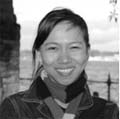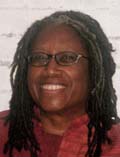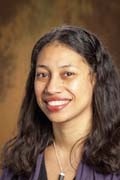
|
Associate Professor Ralph Buck is Head of Dance Studies, National Institute of Creative Arts and Industries, The University of Auckland. His research and teaching focuses on dance education curriculum, dance pedagogy and community dance. Ralph is currently the elected World Dance Alliance Representative upon the Presidential Council, World Alliance for Arts Educators; Co-chair Education and Training committee, World Dance Alliance: Asia Pacific; Dance advisor, UNESCO International Advisory Committee, Second World Conference on Arts Education. Ralph's teaching has been recognised by The University of Auckland Distinguished Teaching Award 2008, and the 2006 Excellence Award for Equal Opportunities. His research in Dance education is published in international journals and he has delivered invited key note addresses and Master classes in Hong Kong, Taiwan, Australia, Columbia, New Zealand and Fiji.
|

|
Shirlita Espinosa is a PhD candidate and tutor at the University of Sydney's School of Languages and Culture. Her research explores the issues of class and gender among Philippine-born migrants in Australia, in particular the materiality of migrant print culture. She is currently a Ford International Fellow. |

|
Jacquelyn A. Lewis-Harris is Director of Connecting Human Origin and Cultural Diversity and she presently holds the title of Assistant Professor in both Anthropology and the College of Education. Jacquelyn has her Doctorate and Master's in Anthropology from Washington University, St. Louis, Missouri. She lived and worked extensively in the Pacific for 27 years with an emphasis on Papua New Guinea and the Pacific Island Diaspora. Her present research concerns two areas, the inherent pedagogy of museum and public exhibitions and their role in shaping public opinion about Pacific cultures and the sustainability of indigenous Pacific Island cultures in extra-local urban environments. |

|
April K. Henderson holds an MA in Pacific Islands Studies from the University of Hawai'i at Mānoa and a PhD in History of Consciousness from the University of California, Santa Cruz. She joined the Pacific Studies Programme at Victoria University of Wellington in Aotearoa New Zealand in 2002, where she is currently Programme Director. Her writing on gender and representation, Pacific Island engagements with popular music and dance, and Pacific articulations of identity and community have appeared in The Contemporary Pacific, Pacific Studies, and the edited collection The Vinyl Ain't Final: Hip Hop and the Globalization of Black Popular Culture (Pluto 2006). After completing a book manuscript on hip hop and Samoan diaspora, a current research focus is on multiethnic 'communities of sentiment' (Appadurai 1996) formed around shared commitment to and participation in popular cultural forms. |
 |
Sean Mallon is Senior Curator Pacific Cultures at the Museum of New Zealand Te Papa Tongarewa. He is author of Samoan Art & Artists: O Measina a Samoa (Craig Potton Publishing and University of Hawai'i Press 2002). He has co-edited book projects including Tatau: Samoan Tattooing, New Zealand Art, Global Culture (Te Papa Press 2010) Pacific Art Niu Sila: The Pacific Dimension of Contemporary New Zealand Arts (2002). His current projects include co-editing Tangata o le Moana: The Story of Pacific People in New Zealand and contributing to Art in Oceania: A History (forthcoming 2012). Sean's interests in dance relate to material culture and documenting performance in museum contexts. |

|
Kirsti Rawstron is a doctoral candidate at the University of Wollongong. Her current research addresses the effectiveness of United Nations Human Rights Conventions in improving women's rights in Australia, New Zealand, South Korea and Japan. She holds a Bachelor of Arts (Honours, First Class) in Japanese Language and Culture and a Bachelor of Commerce in Finance from the University of Otago, New Zealand. She spent a year at the University of Tokyo as part of the AIKOM exchange program. Her latest publication is in New Voices (vol. 4), and she recently presented at the 2011 Japanese Studies Association of Australia conference in Melbourne Australia. |

|
Katerina M. Teaiwa is Senior Lecturer and Pacific Studies Convener based in the School of Culture, History and Language, College of Asia and the Pacific, Australian National University. Katerina has a PhD in Anthropology and MA in Pacific Islands Studies. Her research includes histories of phosphate mining in the central Pacific focusing on the movement of Banaban rock and the complex relations created by the mining, shipping, production and consumption of superphosphate and ensuing commodities. She also studies the ways in which indigenous Banabans make sense of this history in their new home of Rabi Island in Fiji through dance. Her Banaba work has inspired a permanent exhibition at the Museum of New Zealand Te Papa Tongarewa, which tells the story of phosphate mining in the Pacific through Banaban dance. Renowned New Zealand sculptor Brett Graham also transformed Katerina's research into a multi-media installation, Kainga Tahi, Kainga Rua, exhibited at the Adam Art Gallery in Wellington in 2003 and Moving Image Centre in Auckland in 2007. In the last four years, Katerina has also moved into the area of Pacific cultural policy and cultural development research and has worked with UNESCO and the Secretariat of the Pacific Community (SPC) in this growing field. Her most recent project, Indigenous Peoples and the Global Remix, is part of Indiana University's new five year Framing the Global research and publishing project. |
 |
James Welker is a Postdoctoral Teaching and Research Fellow in Asian Studies at the University of British Columbia. His current book project examines transnational engagements among women and adolescent girls in the women's liberation movement, the lesbian community, and the girls' comics sphere in 1970s–1980s Japan. Among his publications are 'Beautiful, Borrowed, and Bent: Boys' Love as Girls' Love in Shōjo Manga' (Signs, 31, no. 3, 2006), which received the MLA's 2006 Crompton-Noll Award for Best Essay in Lesbian, Gay, and Queer Studies; 'Telling Her Story: Narrating a Japanese Lesbian Community' (Journal of Lesbian Studies, 14, no. 4, 2010); and 'Flower Tribes and Female Desire: Complicating Early Female Consumption of Male Homosexuality in Shōjo Manga' (Mechademia, 6, forthcoming). He is also a co-editor of and translator for Queer Voices from Japan: First Person Narratives from Japan's Sexual Minorities (Lexington, 2007), and a co-editor of 'Of Queer Import(s): Sexualities, Genders and Rights in Asia,' issue 14 of Intersections (2006). |

|
Associate Professor Tony Whincup's research interests are primarily concerned with the role of material culture in self-definition and self-recognition. His research emerges at the interface of the disciplines of photography and anthropology. He uses gallery, publication and the conference as sites to communicate his ethnographies. For the past 25 years his photo-ethnographic practice has been based primarily in Kiribati examining the social role of traditional dance, canoes, household artefacts and meeting houses. His current work investigates the effects of imported materials on the memorialisation of the dead.
|

|
Monika Winarnita is currently a PhD candidate in Anthropology at the School of Culture, Language and History at the Australian National University with an external affiliation to La Trobe University, Melbourne. She is also employed at the Centre for Dialogue, La Trobe University as a Project Research Officer in the Australia-Indonesia dialogue, and the Capacity Building for Reconciling Divided Communities in Victoria project. She has a Bachelor in Communication Media/Multimedia and a First Class Honours in Humanities Gender Sexuality and Cultural Studies. Her thesis is on Indonesian migrants in Australia, with recent fieldwork in Perth WA looking at cultural performances in community and multicultural festivals. In her research, she was also involved in an Indonesian women's dance group whose majority members came by spousal visa. Monika's research interests include: migration, gender, cultural performance, political movements: motherhood and diasporic groups, media representation and identity formation; and have published in journal articles and books on these topics. |

|
Dr Pamela Zeplin is a writer and artist based in Adelaide, working at the University of South Australia as Portfolio Leader of Research Education (Art, Architecture & Design) and senior Lecturer in Art and Design History and Theory. Pamela's 2005 UNSW PhD thesis examined 'aesthetic relations' between New Zealand and Australian artists and art institutions (1970–1985). She regularly publishes on and actively participates in events throughout the Asia-Pacific region. Invited presentations include South Project Gatherings in Melbourne, Wellington (NZ), Santiago (Chile), and Soweto (South Africa) and the International Conference on Innovation from Tradition: Art in the Contemporary Pacific at Kaohsiung Museum of Fine Arts (KMFA, Taiwan). With Indonesian artist, Heri Dono in 2007 she curated a major collaborative exhibition, The Dream Republic at the SASA Gallery in Adelaide and in 2009 was invited to participate in the major Austronesian exhibition, Art in the Contemporary Pacific 2009: The Great Journey: In Pursuit of the Ancestral Realm at KMFA. With A/Prof. Paul Sharrad in 2009 she convened an ARC-funded national workshop, The Big Island: Promoting Contemporary Pacific Art and Craft in Australia at the University of Wollongong, resulting in Art Monthly Australia's landmark OzPacifica edition in 2010, focusing on Australian Pacific art. Pamela regularly visits New Zealand and the wider Pacific as a researcher, postgraduate research examiner and consultant. In 2008 she received a national Distinguished Researcher award from the Australian Council of University Art and Design Schools (ACUADS) and an Australian Award for University Teaching: Citation for Outstanding Contribution to Student Learning.
|

|